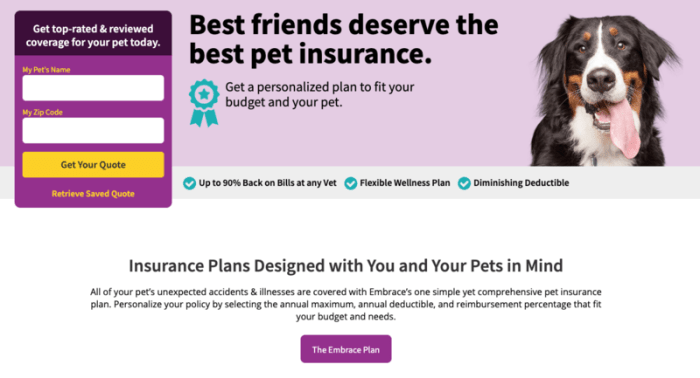Pets best pet health insurance is essential for ensuring your furry friend receives the best possible care. Whether facing an unexpected accident or chronic illness, comprehensive coverage provides peace of mind and financial security. We’ll guide you through the different types of plans, factors to consider, and the claims process, ensuring you choose the perfect policy for your beloved pet.
Discover how preventative care can reduce future costs and protect your pet’s health.
From accident-only to comprehensive plans, understanding the various coverage options is crucial. This guide provides a detailed comparison of different policies, helping you weigh factors like budget, your pet’s age and breed, and health history. Learn about deductibles, co-pays, and reimbursement rates to make informed decisions. We also examine reputable insurance providers, their strengths and weaknesses, and customer satisfaction ratings to aid in your selection.
Introduction to Pet Health Insurance
Pet health insurance provides financial protection for unexpected veterinary expenses, offering peace of mind for pet owners. It covers a range of potential medical issues, from accidents to illnesses, allowing for timely and appropriate care without the burden of substantial out-of-pocket costs.
Types of Coverage
Pet health insurance plans vary in the scope of their coverage. Common types include accident-only plans, which cover injuries sustained in accidents; illness-only plans, which focus on illnesses; and comprehensive plans, which provide coverage for both accidents and illnesses. Choosing the right type depends on your pet’s health and lifestyle.
-
Accident-only: Covers injuries resulting from accidents, such as car accidents or falls. This option is often more affordable but provides less comprehensive protection.
-
Illness-only: Focuses on medical conditions, such as cancer or diabetes. This option may be suitable for pets with a known health predisposition or a higher risk of chronic illness.
-
Comprehensive: Provides the broadest coverage, encompassing both accidents and illnesses. This is generally the most expensive option but offers the most complete protection for your pet.
Importance of Preventative Care
Preventive care is crucial for maintaining your pet’s overall health. Regular checkups, vaccinations, and dental care can significantly reduce the likelihood of costly medical issues. Pet insurance can help offset the cost of these preventative measures, contributing to a healthier pet in the long run.
Beneficial Situations
Pet health insurance can be advantageous in various situations. For example, a sudden illness requiring extensive treatment, a critical injury during a mishap, or the need for ongoing care for a chronic condition can be greatly alleviated by having insurance. Furthermore, it can ease financial stress during times of unforeseen veterinary costs.
Comparison of Insurance Plans
| Plan Name | Coverage Details | Premium |
|---|---|---|
| Basic Accident | Covers accidental injuries, no illness coverage. | $25-$50/month |
| Comprehensive | Covers accidents and illnesses, including pre-existing conditions (after waiting period). | $60-$100+/month |
| Silver Plan | Covers most illnesses and accidents, with some exclusions. | $40-$75/month |
Factors to Consider When Choosing a Plan
Selecting the right pet health insurance plan requires careful consideration of several factors. Your budget, your pet’s age, breed, and health history are key elements to evaluate.
Factors for Choosing a Policy
-
Budget: Assess your financial capacity to cover premiums and potential out-of-pocket expenses like deductibles and co-pays.
-
Pet’s Age and Breed: Younger and certain breeds are predisposed to specific health issues. Insurance plans should account for these potential risks.
-
Pet’s Health History: Any pre-existing conditions will affect coverage and potentially impact the cost of the policy. Understand the waiting period for pre-existing conditions.
Coverage Options
Evaluate the pros and cons of different coverage options. Comprehensive plans offer broader coverage, but higher premiums. Assess your pet’s specific needs to determine the best coverage option.
Financial Implications

Source: consumersadvocate.org
Thoroughly analyze deductibles, co-pays, and reimbursement rates. Understand how these factors affect the overall cost of care and the amount you’ll pay out-of-pocket.
Insurance Provider Reputation, Pets best pet health insurance

Source: pethealthcareonline.com
| Provider | Reputation Score | Customer Reviews |
|---|---|---|
| PetFirst | 4.5/5 | Positive feedback on claims processing and customer service. |
| Trupanion | 4.7/5 | High customer satisfaction ratings, often cited for quick claim processing. |
| Healthy Paws | 4.3/5 | Generally positive, with some reports of minor delays in claim processing. |
Wrap-Up: Pets Best Pet Health Insurance
Choosing the right pet health insurance plan requires careful consideration of your pet’s unique needs and your budget. This comprehensive guide provides the tools and knowledge to navigate the complexities of pet insurance, empowering you to make the best decision for your furry companion. Prioritizing preventative care and understanding coverage limits are key aspects of responsible pet ownership, and this guide helps you achieve both.
Protecting your furry friend’s health is paramount. Finding the best pet health insurance can be a daunting task, but securing the right coverage is crucial for their well-being. To get a head start on comparing plans and ensuring your pet receives the best possible care, exploring a quote for pet insurance, like pets best insurance quote , is a smart first step.
Ultimately, the best pet health insurance is the one that fits your pet’s unique needs and your budget, ensuring peace of mind for years to come.
Ultimately, the right plan safeguards your pet’s health and offers peace of mind.